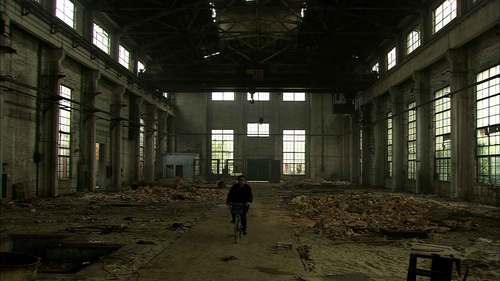Events/Research
07.04.2015
8:00pm
Tales of Fathers and Factories
How to Act: On Stages and Storytellers
Dina Makram-Ebeid & Jia Zhangke
Strategies of dissent against one’s superiors against late pay and temporary contracts, against the mistreatment of figures of authority, are subverted by those in power, taking on the tone of the reprimanding father. Patronizing strategies can not be reduced to a notion of patriarchy, but need to be explored within the conditions facilitating positions of power and the oppressed.
This program complements “Out on the Street” a film by Jasmina Metwaly and Philip Rizk where workers re-enacting the factory become a microcosm of Egypt, by showing a film that resonates with it from another part of the world. “24 City” by Jia Zhangke focuses on a state-owned factory building, a monument to the workers, now being sold to make way for something else. The film tries to question oral narratives by mixing true and false witnesses, actors and non-actors. Both films explore the social relations within the workspace of a factory and its surroundings.
To elucidate some of the social relations that emerge within the factory working space, the paternal relationship between the temporary workers and the permanent ones, anthropologist Dina Makram-Ebeid will speak about her case study and research at the Egyptian Iron and Steel Company in Helwan. The films and the contributor question the representation of reality and discourse not only by collecting alternative oral narratives but by constantly reflecting upon their own practice of representation. Hoping to reach a version that is closer to the reality experienced by them and the people they meet. A reality marked by violence that is intimately produced.
Biography
Dina Makram-Ebeid is a research fellow at Max Planck Institute for Social Anthropology with interests in the anthropology of work and labour, social movements, value, gender, queer politics, property regimes and the post-colonial state. She earned a PhD from the London School of Economics and Political Science in 2013 with a thesis titled “Manufacturing Stability: Everyday Politics of Work in an Industrial Steel Town in Helwan, Egypt”. In her thesis Dina discusses the effects of passing on jobs to one's children on class politics in Helwan and scrutinizes the state's appropriation of workers' intimate desires for stability. Looking at family idioms in the workplace and everyday patriarchal practices at work, she reflects on inequalities, impasses and violence that are intimately produced and hegemonically circulated.
This event will be held in Arabic. '24 City' with Arabic subtitles.
This event is part of “How to Act: On Stages and Storytellers”, the dénoumenet to Beirut’s three years of programming. “How to Act” follows a series of tangents departing from Metwaly’s and Rizk’s references, from classical cinematic works to the current practice of activists, artists, scholars and researchers, in Egypt and elsewhere.
Film Synopsis
24 City
112 min., Mandarin, Color, 2008
Jia Zhangke
The film follows three generations of characters in China’s Chengdu (in the 1950s, the 1970s and the present) as a state-owned factory gives way to a modern apartment complex. Scenes of factory operations, of the workforce, and of buildings stripped bare and then razed, are inter-cut with workers who were born in the 1930s, 1940s, and 1950s telling their stories - about the factory, which manufactured military aircraft, and about their work and their lives.
